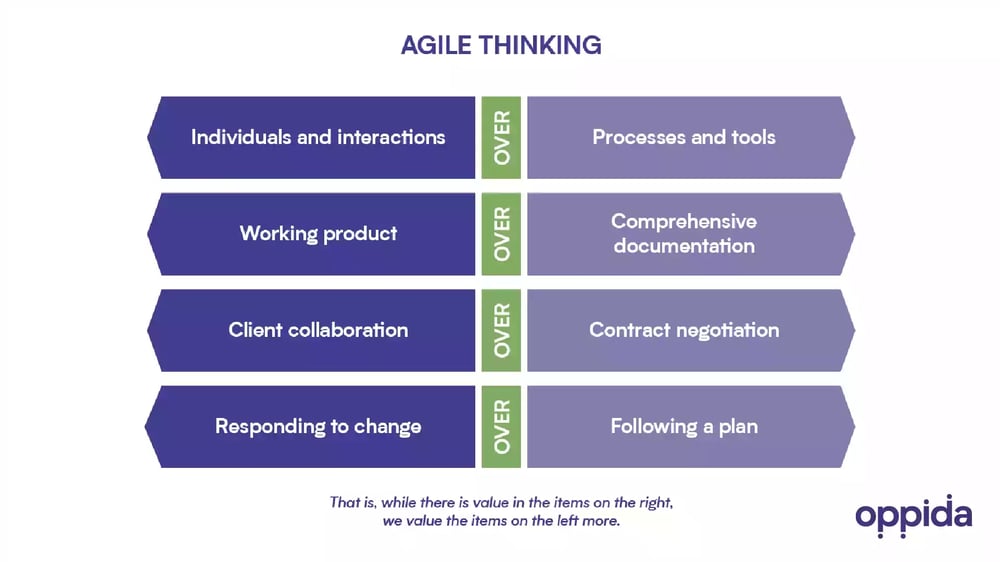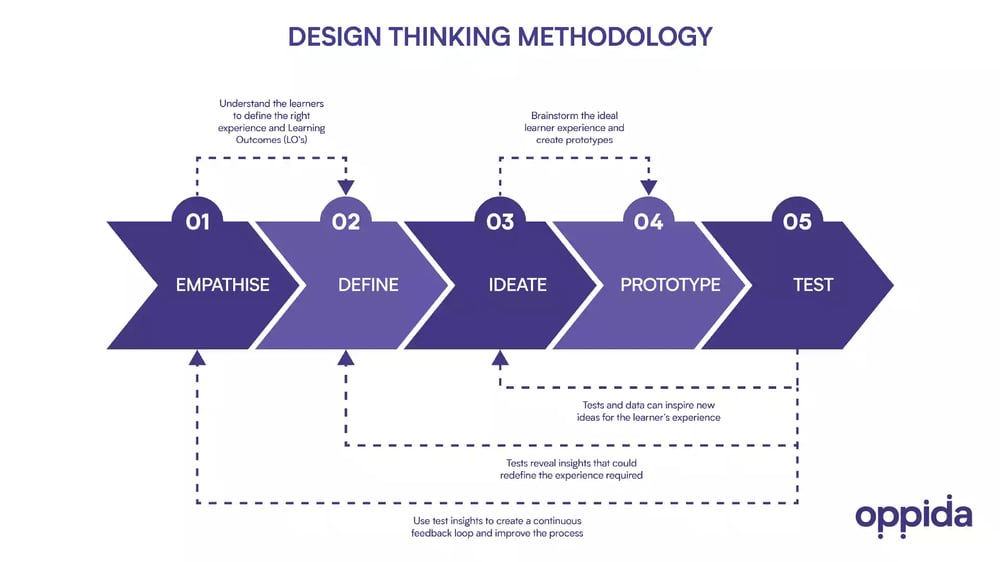At Oppida, we believe in raising the bar, especially in our own courses! We’ve made new higher...
How agile thinking transforms online course design (and makes it easier for your whole team)
Ever heard of Agile thinking?
In start-up terminology, ‘implementing best practices’ often means merely mimicking what other companies are also doing.
At Oppida, our core organisational aims are to take a stand for learning design and raise the bar in online education so frankly, we’re pretty unique out there in the global online education sector: the unicorns of quality online course development!
The team at Oppida already optimises best practice in all our programs and processes. Instead, we have an eye on the future and are busy carving out next practices for the future of digital education. This journey sees us working alongside clients who care about quality and the learner journey as we do and establishing Agile processes that facilitate course creation and development in the best possible way to achieve that goal. We refer to this as The Oppida Way.

Tailored solutions and inherent beliefs
At Oppida, our next practices revolve around the Agile approach of improving our discover/design/development/migration/enhancement/publishing services processes (whichever tailored solution we’re implementing for the client) that serve us in our overall organisational aim. We pride ourselves on being able to help our customers at any stage of the online course development lifecycle.
Software methodology in a digital education space
The Agile methodology was initially born out of techniques established by software development gurus to change their approach to planning and delivering new products in the early 2000s.
The methodology has since evolved and adapted and many companies across a variety of sectors now apply the hallmarks of Agile thinking to optimise speed to market, instigate rapid user feedback and make continuous improvements whatever their product/project development process creates and outputs.

Agile thinking
Agile thinking is not just about aiming for technical and process excellence in course development. Agile practices revolve around efforts that empower people to truly own their work and efficiency. The methodology aims to motivate an internal understanding of the best approach for each task and interaction while working as part of a team. Oppida adopts Agile thinking to identify opportunities for growth in soft skills and self-improvement practices too, not just on projects, but at a company level too.
Organisational level: Oppida and Agile thinking
These four central tenets of Agile thinking are core to our values. Deadlines and deliverables are important, but always remember we are humans designing for other humans.
Oppida’s Agile thinking with clients:

Becoming agile involves us all working together as the Oppida family to create a culture focused on design, quality, collaboration, continuous improvement, and delivering value to our customers.
Project level: Oppida and design thinking methodology
Oppida designs, develops, enhances, and migrates according to design thinking methodology.

As you can see, the design thinking methodology is a non-linear, iterative process that we leverage to better understand the students’ experience as they navigate our online learning creations. The process helps us to challenge both our own and clients’ assumptions, redefine problems that the student is encountering and create innovative solutions to prototype and test. Involving five phases—Empathise, Define, Ideate, Prototype and Test—it is a strong design approach to use to tackle problems that are ill-defined or, as yet, are unknown.
Following this process journey sees us using a feedback loop from clients and students to make improvements along the way before reaching the final destination. We then take these on board for the next time around with the development process for any following projects with the same client. These improvements can take any shape or form: how we approach communication with internal and external stakeholders on the project, navigation pages in the LMS that the student travels through, or who/how reviews are finalised for example. We also share process hacks across the organisation and implement them in other projects too.
Process mechanisms to enhance flow and productivity
As part of the design thinking methodology, we use the following tools and forums to help us garner this feedback from multiple sources and inform the improvement steps:
- student focus groups
- student engagement and analytics—during and after the course
- project post-mortems—for both internal and external stakeholders in the projects
- feedback logs
- Slack chats
- stand up meetings
- project escalation meetings—if it gets to this point.

Continuous feedback and improvement
One’s destination is never a place but rather a new way of looking at things.
Henry Miller
For us, destination lies in realising and publishing quality online learning courses for our customers through tailored solutions. This is why we also continuously iterate and enhance the process journey our teams take to improve those of the students’ learning experiences that are at the core of all of these courses.
After each project, project stakeholders from Oppida and the client team are invited to a project post-mortem where we can blamelessly reflect and discuss how the process could be more effective. Internally, the key is to retune and adopt these new ideas as part of the next project iteration whether with the same or a different client.
By fostering an agile mindset and adopting iterative processes, we help our team and clients challenge assumptions, redefine problems and improve on our practices again and again, ultimately leading to a better experience for learners. If this way of working resonates with you, get in touch to find out how we can support you to develop quality, engaging courses.


